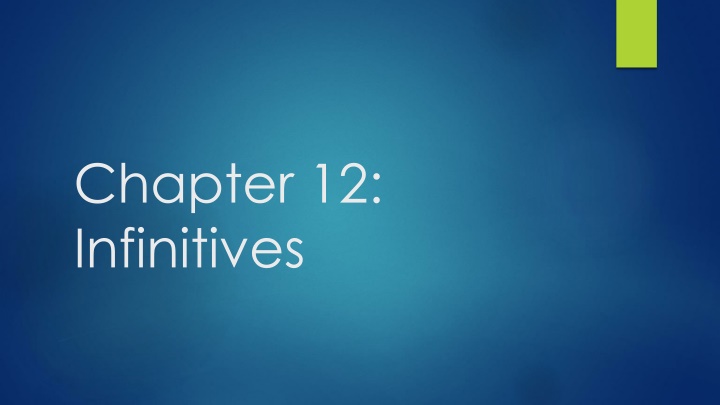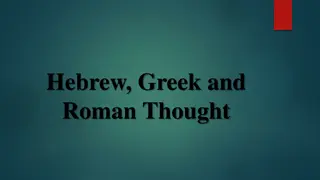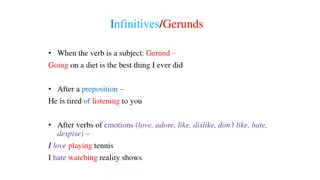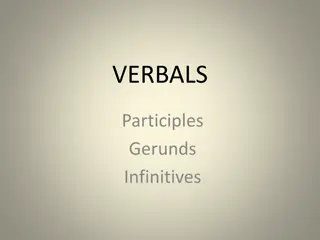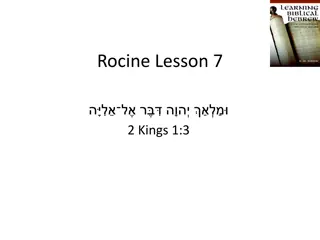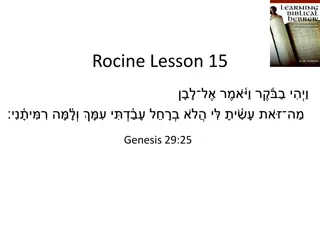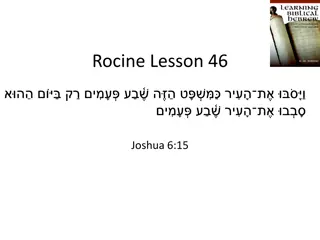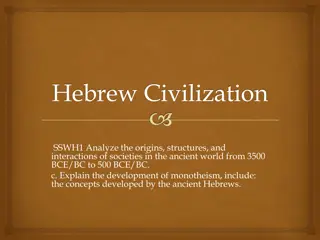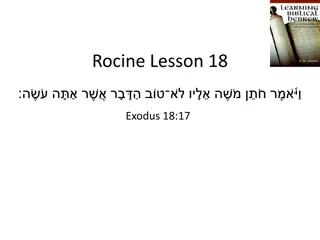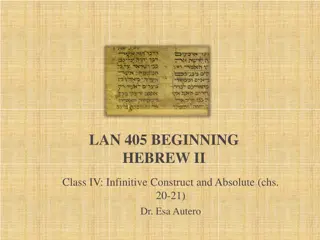Hebrew Infinitives
Dive into the world of Hebrew infinitives, exploring the nuances between Infinitive Absolute and Infinitive Construct. Uncover the different usages of Infinitive Absolute, such as for emphasis or expressing duration, through detailed examples and explanations. Enhance your knowledge of Hebrew grammar with insights into the forms and parsing of infinitives, shedding light on their unique characteristics.
Download Presentation

Please find below an Image/Link to download the presentation.
The content on the website is provided AS IS for your information and personal use only. It may not be sold, licensed, or shared on other websites without obtaining consent from the author.If you encounter any issues during the download, it is possible that the publisher has removed the file from their server.
You are allowed to download the files provided on this website for personal or commercial use, subject to the condition that they are used lawfully. All files are the property of their respective owners.
The content on the website is provided AS IS for your information and personal use only. It may not be sold, licensed, or shared on other websites without obtaining consent from the author.
E N D
Presentation Transcript
Chapter 12: Infinitives
12. A. Introduction to Infinitives Finite verbs are limited or specify the gender, person and number of the subject of the verb. An infinitive has no limitation of subject in gender, person or number. In English an infinitive is indicated by a to before the verb (e.g. to run, to go, to jump). There are two types of Hebrew infinitives: the Infinitive Absolute and the Infinitive Construct.
12. A. Introduction to Infinitives There are about 513 Qal Infinitive Absolutes and 4561 Qal Infinitive Constructs. The difference is that the absolute usually follows or precedes a verb with the same root without any attached prefixing prepositions (other than a conjunctive ) or suffixed pronouns. The construct is often constructed with a preposition and/or pronominal suffix.
12. A. Introduction to Infinitives The forms and chant is: Inf. Construct: Inf. Absolute: Parsing: because there is no person, gender or number these are easily parsed as simply (note it is the same as the 2ms Imperative) Qal Inf. Absolute from to give
12. B. Infinitive Absolute 3 Usages Surely [before]: When an infinitive absolute stands in front of its cognate verb it is often for emphasis (e.g. surely keep). Continually [after]: When it follows its cognate verb it often emphasizes the duration or continuation of the verbal concept. Imperative [alone] When it stands alone sometimes it can be translated as an imperative or as a normal perfect or imperfect.
12. B. Infinitive Absolute or defectively as from to eat from to say from to enter or from to be from to go from to know (notice the Pata furtive under the Ayin)
12. B. Infinitive Absolute from to go out from to give or from from to rise or from to see from to hear (notice the Pata furtive under the Ayin)
12. B. Infinitive Absolute: Examples: (Gen 15:13) Know for certain that your descendants will be strangers (Gen 18:10) I will surely return to you (Exod 13:3) Moses said to the people, "Remember this day
12. C. Infinitive Construct The infinitive construct often is prefixed by a preposition (and suffixed by pronominal suffix): + Inf. Construct verb = purpose or intention in order to, or by -- to seek is a frequent fixed forming meaning saying as a marker of direct discourse + Inf. Construct Verb = when or while x verb [went, arrived ] + Inf. Construct Verb = when or while x verb [went, arrived ]
High frequency Infinitive Construct forms from to keep, guard from to give (alternative form ) from to lift, carry (alternative form ) from to say from to sit, dwell
High frequency Infinitive Construct forms from to walk, go from to know from to come from to turn, repent from to build from to be from to see from to hear
Infinitive Construct Examples Examples: (Gen 1:22) God blessed them, saying, "Be fruitful and multiply and fill (Gen 2:17) for in the day that you eat of it you shall die (Gen 3:24) to guard the way to the tree of life
12. D. Chapter 12 Qal Infinitive Vocabulary List / Lord, master 439 to give birth, beget 495 who, how? 424 justice, judgment 421 to strike, hit 500
12. D. Chapter 12 Qal Infinitive Vocabulary List mouth, opening 497 again, still, yet 490 eternity, forever 439 holy, set apart, sacred 491 voice, sound 505
12.G. Chapter 10-11: Sing Song: Hatikva (The Hope) Israeli National Anthem (from a poem by Ukranian Jew, Naftali Herz Imber, 1877). And onward, towards the ends of the east, ; an eye still gazes toward Zion; https://www.youtube.com/watch?v=1DPqNHkm1bM https://www.youtube.com/watch?v=af6VgvkWq48 As long as in the heart, within , A Jewish soul still yearns Our hope is not yet lost, The hope two thousand years old, To be a free nation in our land, The land of Zion and Jerusalem.
